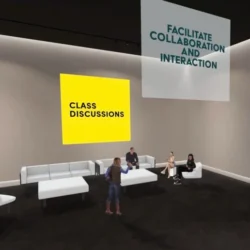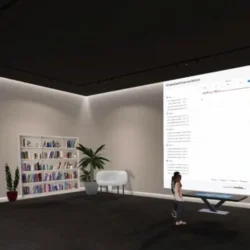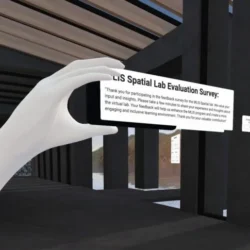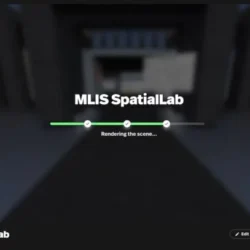MLIS SpatialLab – Aisha Abdul Rahman
Beyond Books: Exploring the Power of VR in the MLIS Spatial Lab;
a case study for a hands-on, visual-based MLIS Curriculum with Spatial.io
“Librarians, museum curators, and educators are exploring virtual worlds and developing simulated immersive learning environments, particularly in Second Life 1(SL) because of the numerous tools for building virtual environments that are provided. Understanding the perceptions toward virtual worlds and the factors contributing to adoption will be important in planning and evaluating the successful use of this innovation.” (V. Hill & H.-J. Lee, 2010)
Introduction to Spatial.io
Spatial.io is an innovative virtual reality (VR) platform designed to facilitate immersive and interactive experiences in virtual spaces. It allows users to create, share, and explore 3D environments, making it an ideal tool for collaboration, education, and creative projects. With Spatial.io, users can build custom virtual rooms, host meetings, and events, or create dynamic exhibitions and galleries. The platform is accessible through VR headsets, web browsers, and mobile devices, offering a versatile solution for those looking to engage with digital content in a highly interactive and engaging way.
Project Objectives:
The proposed project aims to introduce a virtual MLIS (Master of Library and Information Science) program within the iSchool Library Science and Information Technology organization. This project seeks to leverage augmented and virtual reality technologies to create an immersive and interactive learning environment for students, with a particular focus on catering to hands-on and visual learners.
The project will address the need for alternative learning experiences by providing a virtual environment that goes beyond traditional textbooks and lectures. By integrating a virtual space into the curriculum, iSchool students will have the opportunity to engage with the subject matter through practical and visually stimulating activities, bridging the gap between theory and practice.
The virtual MLIS program will cater to hands-on learners by enabling them to manipulate objects, interact with digital resources, and engage in realistic simulations within a digital library setting. This approach will enhance their practical skills and provide tangible experiences that foster a deeper understanding of concepts, while also facilitating opportunities to explore and use new and emerging technologies hands-on.
Virtual Exhibit Overview:
The iSchool MLIS program and curriculum currently face challenges in meeting the needs of hands-on and visual learners. Traditional instructional methods often fail to provide interactive and immersive learning experiences, resulting in decreased engagement and limited comprehension for these learners.
The absence of practical and visually stimulating approaches within the curriculum hinders the ability of students to grasp complex concepts and develop the necessary skills for their future library science careers. To address this problem, our project aims to leverage the potential of augmented and virtual reality through the implementation of a virtual space or classroom using Spatial.
Upon entering the Exhbit, guests are met at the entrance with general instructions on how to navigate the space. As they continue they find a prototype of a virtual reference desk. It is here that it is proposed that students can role play or even intern as a Reference Librarian to gain hands-on skills.
There are several “exhibition” areas that include a discussion seating area. Where class discussions can take place via chat and with seeing visual cues provided with the use of avatars. Examples of visual learning tools and alternative ways that certain theoretical courses could be taught in virtual worlds such as EAD, and XML. As well as historiographical research.
Release Date: January 27, 2024
Audience Engagement and Feedback
- Engagement Overview:
- Detail: MLIS Students toured the space and left feedback via a google form survey in the main hallway at the entrance/exit
- Testimonials: ” This is a great concept, especially for hands-on learners”
Technical and Collaborative Insights
- Development Insights:
- Spatial.io Features: Spatial.io was utilized to create an immersive, 3D environment and figures more accessible and engaging, such as the ability to interact with virtual objects or discuss the content together in real time.
- Learning Curve: The learning curve associated with using Spatial.io is minimal. The interface is straightforward and does not require a 3D modeling experience unless you choose to use Unity.
- Collaborations:
Presentation Materials:
Step into the future of library and information science with the MLIS Spatial Lab project. Discover how virtual reality can transform learning and professional practice, making complex concepts accessible and engaging. Explore the exhibit today or contact me to discuss how we can bring similar innovations to your educational programs and enhance the learning experiences for your students.
All information and content on this portfolio and case study are my intellectual property and may not be used, reproduced, or distributed without my explicit written permission.






Leave a Reply